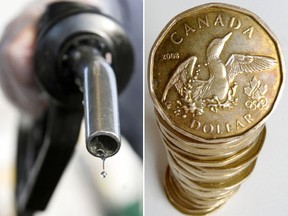Crude set to cut short the Canadian dollar’s best rally of the year
And that's music to the ears of hedge funds that are still near the most bearish on the Canadian dollar in over two decades

Article content
By Katherine Greifeld and Andrea Wong
Slumping crude prices appear set to cut short the loonie’s best run this year. That’s music to the ears of hedge funds that are still near the most bearish on the Canadian dollar in over two decades.
The currency’s rally, fuelled in part by surprisingly hawkish comments from central bank officials this month, is on the cusp of stalling as crude prices plunge. The currency weakened 0.4 per cent last week, after a six-week, 4.1 per cent rally that was its strongest since late last year. Historically, the oil-sensitive currency has been more correlated to crude than monetary policy amid commodity routs. With grim prospects for when oil might climb out of its downtrend, the loonie looks poised to extend its slump as one of the worst performing major currencies into next quarter.
If oil stays on the defensive, the loonie's rebound is over
Bank of Montreal economist Douglas Porter
“The Canadian dollar, which had been blithely ignoring the latest sag in crude, has finally awoken to the oil slick,” Bank of Montreal economist Douglas Porter wrote in a note to clients last week. “Suffice it to say if oil stays on the defensive, the loonie’s rebound is over, and the BOC is going to stay on the sidelines for a while longer yet.”
Loonie bears were squeezed after Bank of Canada Governor Stephen Poloz and his deputy Carolyn Wilkins indicated earlier this month that the BOC’s next move would likely be a rate hike, sparking the biggest two-day rally for the currency in over a year. Yet with the outlook for oil dimming and signs inflation remains subdued, analysts and investors are pessimistic that the central bank will be able to deliver on its hawkish rhetoric. Short positions by hedge funds and other large speculators outnumbered longs by 82,881 contracts in the week through June 20, just off record bearish positioning established last month.
An interest-rate increase in Canada this year is not a given, according to Aubrey Basdeo, head of Canadian fixed income at BlackRock Inc, the world’s largest money manager. He argues that even as the country’s economy continues to improve, the decline in crude and worries over the housing market will temper the central bank’s willingness to act quickly.
“It’s not a slam dunk,” said Basdeo, who expects the Bank of Canada to increase rates in the first quarter of next year. “Some things are saying yes and some are suggesting they should be a little more cautious. That’s why they should allow the economy to run hotter than normal for a period of time to ensure that they’ve really entrenched the recovery.”
Oil is one of Canada’s largest industries, with crude being the country’s largest export last year.
The currency’s correlation to oil was tested on the heels of the BOC’s comments, with the loonie strengthening against the dollar despite declining oil prices. The correlation quickly snapped back when oil sank below US$43 a barrel — and again when prices rebounded from that 10-month low on Wednesday.
Traders should be wary of any short-lived “decouplings,” said Valentin Marinov, head foreign exchange strategist at Credit Agricole. The bank has a long position on USD/CAD, and doesn’t expect the Bank of Canada to hike rates until the second half of 2018.








